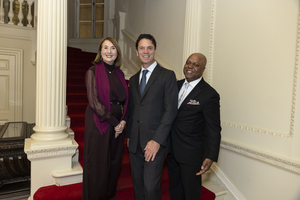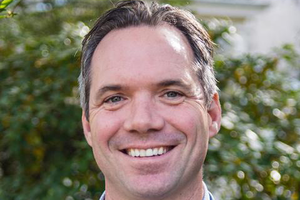Penn GSE Senior Fellow Kandi Wiens leads a program on preventing burnout at a December 2022 Center for School Council Studies meeting hosted on the Penn campus. The Center is part of Catalyst, Penn GSE’s center for global education innovation. (Photo by Eliene Augenbraun)
As today’s school district leaders navigate unprecedented pressures, Penn GSE’s Center for School Study Councils is evolving, adding resources, building a new West Coast network, and eyeing further growth to better support K–12 leaders as they serve students and families nationwide.
The Center was founded in 1943 to help administrators work together to identify professional challenges, share best practices and provide development opportunities. For years, it grew but focused primarily on Pennsylvania, Delaware, and New Jersey so teams could meet frequently in person.
When the pandemic forced the group to move online, Director Tim Foxx said the Center could invite more participants and expand its scope. So in 2022–23, they launched a pilot project to grow into an entirely new region, creating what is known internally as the Coastal Collaborative. The working group has 20 people from three school districts in Southern California, broken into four teams.
Joining the pilot allowed leaders in the Vista Unified School District to connect with other educators in the state and peers on the East Coast, too. And it opened up a new knowledge base within Penn GSE that they could tap into.
“We love the chance to step out of [our] siloed district work and see a larger view and expand our thinking as we challenge ourselves to redesign our schools to best support students post-pandemic,” said Nicole Allard, Executive Director of Educational Excellence and Innovation for the district.
There are now approximately 130 members, including those who recently joined from California. The pilot was considered successful, and Foxx and his team are working to identify where the Center can make the most impact moving forward. He hopes to begin adding other regions—including a potential group in the Southern region of the U.S.—over the next few years and to build a robust virtual platform to help facilitate idea-sharing across the enlarged footprint.
“We need to identify where there is the most need and where we can help generate the most benefit. Superintendents face many of the same issues, but the [regional] differences are nuanced, and that matters," he added.
“Our goal will always be to bring the resources and research of Penn GSE and the entire University, and make it more readily accessible to folks across the country and internationally,” Foxx said, stressing that arming educators with the latest information, best practices, tools, and emotional support of their colleagues is essential to helping them adapt quickly to increasing political polarization, educational inequity, teacher shortages, and other post-pandemic realities.
Media Inquiries
Penn GSE Communications is here to help reporters connect with the education experts they need.







